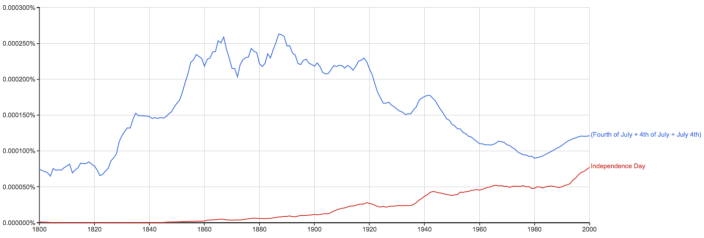Do you refer to the United States’s birth by saying “Happy 4th of July!” or “Happy Independence Day!”? If you are like most, you have probably almost always thought of today as the 4th of July. As Bruce Martin points out in his blog article, “On Independence Day, Fourth of July, Fireworks Day, Whatever We Call It,” there are many important rhetorical differences between the two, and our common choice speaks volumes to what we do and do not really value.
Before going further, here is an image (click to enlarge) from GoogleBooks (nGrams tool) that gives a really good idea of how the two have been used in printed English over time:
Additionally a quick search on Google brings:
65,700,000 results for “Independence Day”
351,000,000 for “4th of July”
4th of July conjures up images of BBQs, family get togethers, maybe a day off from work if you are lucky, fireworks, parades, powerful classical musical (though historically misappropriated), Christmas in July sales, and a kind of high-mark of the summer in general.
None of this is bad in and of itself. But this in no way actually celebrates or reflects on the ideals of how the United States was formed. Although Christmas, for example, is not without similar issues created in part by hyper-consumerism, there is still an emphasis among those who celebrate it in Churches to reflect on the founding of Christianity.
By not saying “Happy Independence Day” all the time, we consciously and unconsciously (further) avoid all of the on-going (and increasingly of late) contradictions between the United States’s long history and its ideals and its still current trajectory and ideals. For a nation so ready to scream, “FREEDOM OF RELIGION” and “ALL ARE CREATED EQUAL” and to proclaim “THE AMERICAN DREAM AWAITS,” we sure do have a ridiculous time actually coming anywhere close to actually meaning this – we should be ashamed and embarrassed as a nation.
The other problem with today–although it is only natural and perhaps needed given the nature of humans–is the deliberate re-writing of our nation’s founding. This national mythology is very powerful today. Even President Obama is guilty of perpetuating this. Take a look at this address from today. (Email subscribers will probably need to visit this webpage.)
Our so-called Founding Fathers really did mean “all men are created equal.” Women–even by the language of their time–were deliberately left out and were not “included” in this male-centric diction. And if you would like to debate this point, I’d ask that you look at how women, Blacks, Indians, and others were treated. White cis-Men are the only group in the United States’s history that have not faced codified, institutionalized, perpetual discrimination.
The nature of racism by the 1770s and 1780s was so assumed and so everyday that it was not necessary to say “all White men are created equal.” Just as I discovered in my research on the University of Houston during the Culture of Segregation: it was so assumed–part of the historical unconsciousness–that Black individuals were not going to be admitted, that there was no contradiction between this fact and UH’s fully open-admissions policy.
Additionally, these Founding Fathers also had in their grand and radical vision a society where this would only be extended to wealthy individuals.
While things have absolutely changed and we have expanded on these grand and radical ideas in many ways–such that the so-called Founding Fathers are “rolling in their graves” to borrow the cliché–a simple look at history–history defined as everything from less than a micro-second ago–shows us how much things have not changed.
Perhaps if we sincerely reflected on the nation’s true origins (including that the so-called Founding Fathers created something much more like an oligarchy than a “democracy” or republic and had a deep-rooted fear of the common person) and true problems even 20% as much as we sincerely celebrate the (racist) institution of Football, every one would feel comfortable saying the Pledge of Allegiance, especially it’s promise “with liberty and justice for all.”
Additionally, you can find the full Hidden Power of Words Series here.
